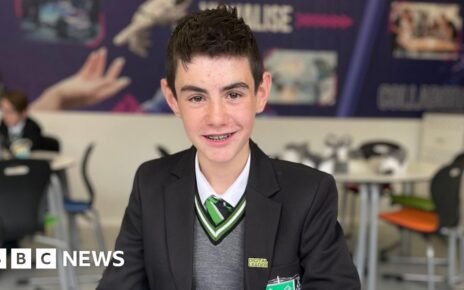[ad_1]
 Cheshire Constabulary
Cheshire ConstabularySafeguarding services involved with a girl before she murdered a teenager did not know about her “fascination with violent acts” and had “no reason to be concerned” about their contact, a review has found.
Scarlett Jenkinson and Eddie Ratcliffe were jailed for life for the “brutal, planned and sadistic” murder of 16-year-old Brianna Ghey in a Warrington park in February 2023.
Jenkinson, who was 15 at the time, had moved to Brianna’s school in November 2022 after spiking a younger pupil at her former school.
An independent safeguarding review found there had been “no reason known” to stop Jenkinson “mixing freely” with pupils after her move and nothing to suggest she was a “serious risk”.
Jenkinson and Ratcliffe were found guilty of Brianna’s murder in December 2023 and a judge subsequently lifted reporting restrictions on them being named when they were sentenced two months later.
A review of contact with Jenkinson was subsequently ordered, covering her interactions with support agencies in Warrington.
It did not cover Ratcliffe, due to him living in neighbouring Wigan.
 Family handout
Family handoutIt said Jenkinson had moved from Culcheth High School to Birchwood Community High School in November 2022 after she gave a 13-year-old a cannabis sweet, which caused them to fall ill.
It found that Jenkinson had been seen by GPs and child mental health services in the years before murder, but safeguarding agencies were not aware of her two previous attempts to murder Brianna in January 2023.
It also found that they did not know she had used the dark web to watch videos of torture and killing, a fact that was revealed at her trial.
Mental health
The review said Jenkinson met with GPs and child mental health services to discuss anxiety and self-harming in November 2021 and had several subsequent meetings.
It said in the weeks before Brianna was killed, Jenkinson described hearing voices that were “saying unkind things and putting her down”.
However, it said clinical evidence for Jenkinson’s diagnosis of “conduct dissocial disorder”, which was revealed at her sentencing, was not present before the murder as mental health services were “still in the process of assessing… and formulating a clinical opinion” at the time of the attack.
The review also said Jenkinson’s spiking of the younger pupil in September 2023 was “at best unkind, or worse a deliberate attempt to give someone what could be a frightening experience”, but was not behaviour “at a level which could reasonably be expected to make practitioners suspect that [she] would go on to commit murder”.
However, the review found a safeguarding file detailing non-proven suspicion over Jenkinson’s cannabis use and her history of self-harm was not shared between the schools, which would have been necessary to help ensure her move was a success.

The review said police chose not to take any further action and to support the Culcheth High School’s intervention after the spiked pupil declined to a make a complaint.
Despite that, it found an officer should have visited Jenkinson and her parents to make it clear this was a “serious offence”, which would have also allowed them to “assess family dynamics”.
In conclusion, it said “practitioners” who knew Jenkinson before the murder “were not aware of anything that would have made them think that she was a serious risk to others”.
“They did not know of Scarlett’s fascination with violent acts,” it said.
“They saw no reason to be concerned about any contact with Brianna that they knew about.”
The review made a series of recommendations over how agencies handle the moving of vulnerable children between schools in future and how to support the safeguarding of children online.
It also said Warrington Safeguarding Partnerships should seek evidence from the police that they have addressed their learning in terms of home visits and seek assurance from each agency involved in the review that learning points had been identified and actioned.
[ad_2]
Source link freeslots dinogame telegram营销




